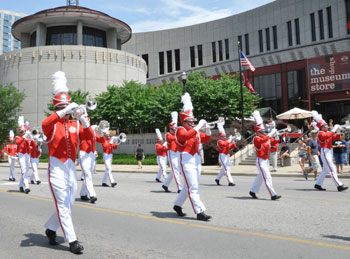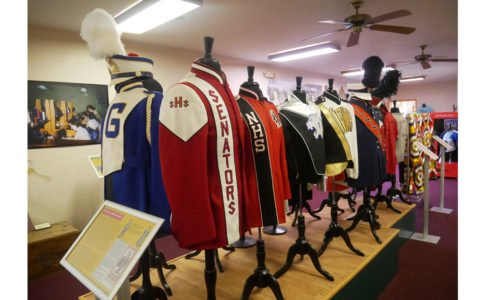While a number of drum corps left the field the past few years, the Music City Drum and Bugle Corps has defied the odds by becoming a new Open Class corps this year.
Photo courtesy of Music City Drum and Bugle Corps
There’s a new kid in town this summer. From Nashville, Tenn., the Music City Drum and Bugle Corps will march its first season in Drum Corps International Open Class. Halftime Magazine spoke with Keith Hall, executive director of Music City and owner of uniform manufacturing company The Band Hall, to find out about this new group.
Halftime: Tell me about your band/corps experience.
Hall: I marched in Memphis Blues Brass Band Drum and Bugle Corps in 1980 and was one of the drum majors, and I was a band director for nine years before starting The Band Hall. I also used to teach for Sky Ryders Drum and Bugle Corps.
Halftime: Why did you decide to start this corps?
Hall: Because my drum corps experience with Memphis Blues was such a positive one, I wanted to be a part of starting a drum corps for a long time. We wanted sort of a wholesome image for the corps and also one that didn’t have a real specific identity, so that we could change the music from year to year. The uniform is just very all-American.
Halftime: Where did the corps get its funding?
Hall: Contributions from individuals. This first year was such a limited rehearsal and touring schedule that we have a much smaller budget than likely any drum corps has ever had. Most of the instructional staff is strictly volunteer.
Halftime: Who are the current members?
Hall: We’re focusing our recruiting efforts on college students. So the average age is 19, and they are more accomplished and experienced players, and a few of them have marched in drum corps before.
Halftime: What kind of responses have you received from the local community?
Hall: My company The Band Hall is helping with uniforms and flags. The top of our list right now is seeking local sponsors. We [had] our first public performance at the CMA Music Festival and [led] the parade. It [was] our first chance for the people of Nashville to see the corps, so this [was] our big effort to seek potential corporate sponsors.
Halftime: What was DCI’s response?
Hall: DCI has been very helpful. Of course they’re always interested in new drum corps forming. They’re encouraging us to start small and grow slowly, keeping everything on a strong foundation.
Halftime: What has been the hardest part about starting the corps?
Hall: Just the fact that it’s the first time for everything. … The staff not knowing each other, and everyone having a different idea of what a first-year Open Class corps should be, and the members not exactly knowing what they’re signing on for, and everything coming together with a unified vision has been hard. I’m already looking forward to the second year where everything will be much easier, especially recruiting because all your prospective members will have seen the corps the first year and have a much more concrete idea of what they can expect the corps to be.
Halftime: What would you say are the corps’ founding principles and ideals?
Hall: It’s just wanting to entertain the audience, having fun and giving a great performance.
Halftime: What is this year’s show?
Hall: The show is in three parts: The first part is about what we are, the second part is about where we’re from, and the third part is about where we’re going. So the opener includes several famous marches, and the second tune is “Tennessee Waltz,” and the third tune is a very exciting forward-moving arrangement of “Appalachian Morning.” The show is entitled “STRIKE IT UP … a celebration!”
Halftime: How is Music City different from other corps?
Hall: I would like to make the drum corps experience available to students without asking them to live, breathe and eat drum corps. So it’s possible that we always have the shortest rehearsals and the shortest touring schedule and the smallest membership fees.
About the Author
Elizabeth Geli is an editorial assistant at Halftime Magazine. She began playing the flute 13 years ago in Placentia, Calif., and marched in the Valencia High School Tiger Regiment. She earned a degree in print journalism from the University of Southern California (USC) and marched in the Trojan Marching Band (TMB) for four consecutive Rose Bowls and Parades. Now she is working on a Master’s in Specialized Journalism (The Arts) at USC and is a graduate teaching assistant and band librarian for the TMB.


